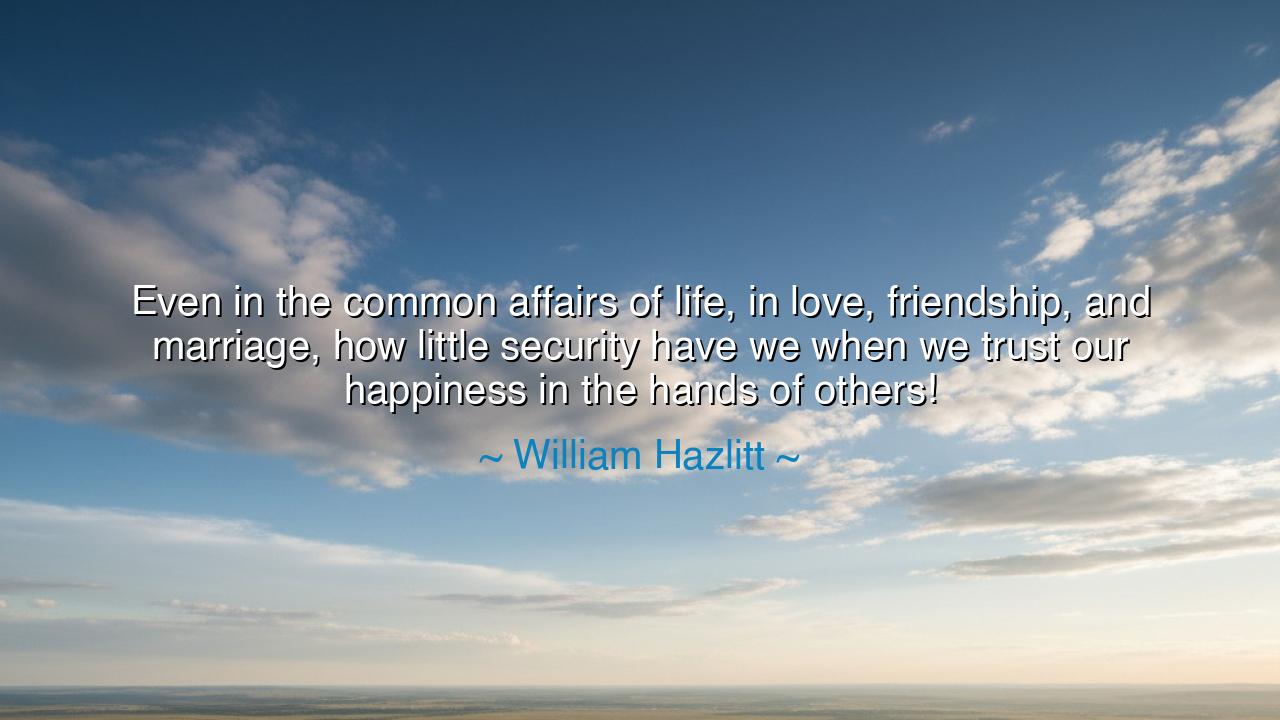
Even in the common affairs of life, in love, friendship, and
Even in the common affairs of life, in love, friendship, and marriage, how little security have we when we trust our happiness in the hands of others!






“Even in the common affairs of life, in love, friendship, and marriage, how little security have we when we trust our happiness in the hands of others!” Thus spoke William Hazlitt, the English essayist whose pen pierced through illusion to reveal the quiet tragedies and triumphs of the human heart. His words are not the cry of bitterness, but of wisdom—an ancient warning dressed in the language of his time. In them lies a truth that has followed humankind through every age: that to entrust one’s happiness wholly to another is to build one’s peace upon uncertain ground. For the hearts of men and women are restless, ever-changing; and what depends on another’s constancy is forever exposed to the winds of fate.
The origin of this insight comes from Hazlitt’s deep study of human nature, drawn not from philosophy alone but from the living world around him. He was a man of observation, of passion and solitude, who understood the frailty of affection and the impermanence of all worldly bonds. In his essays, he often explored the tension between love’s ideal and life’s reality—how we yearn to merge our souls with others, yet are perpetually disappointed by the limits of human nature. His reflection here is born from that universal ache: that even in love, even in friendship, even in the sacred covenant of marriage, we find that no mortal hand can perfectly guard our joy. For every human heart carries both light and shadow, and even the most devoted can fail.
Yet Hazlitt’s words are not meant to drive us into coldness or isolation; they are meant to awaken strength. To recognize that our happiness cannot be entirely in another’s keeping is to reclaim the power that is rightly our own. The wise man loves deeply, but not blindly; he gives freely, but without surrendering his soul. He builds the fortress of his peace within, not upon the shifting sands of circumstance. For when we make others the keepers of our contentment, we chain our joy to what is beyond our control—and when those bonds break, as all things mortal must, we find ourselves destitute and undone.
Consider the story of Marcus Aurelius, the philosopher-king of Rome. Surrounded by betrayal, war, and the endless disappointments of men, he wrote in his Meditations: “Look within. Within is the fountain of good, and it will ever bubble up if thou wilt ever dig.” He, like Hazlitt, understood that while affection and loyalty enrich life, they cannot secure peace. When his beloved wife Faustina died, and when his friends turned against him, he did not curse the heavens; instead, he turned inward to the source of his own strength. His grief did not consume him, for his happiness was anchored not in the shifting hearts of others, but in the steadfastness of his own reason and virtue.
Hazlitt’s insight is, therefore, not one of despair, but of liberation. It reminds us that love, friendship, and marriage are not prisons in which we surrender our autonomy, but gardens in which we share our joy. To depend wholly upon another for one’s sense of worth is to burden both oneself and the beloved. For love to flourish, it must flow from wholeness, not from need; from strength, not from weakness. The lover who stands upon his own foundation loves more purely, because he does not seek possession, but communion. And the friend who is secure in his own spirit gives more freely, because he does not fear loss.
Yet, this does not mean that we must live untouched by others, for solitude without affection is a barren soil. Rather, Hazlitt calls for balance—to cherish connection without surrendering independence, to give love without forfeiting self-respect. To be capable of joy in companionship, yet not undone by its loss, is to live wisely and well. It is to walk the middle path, where devotion and dignity coexist. The wise heart loves deeply but stands firm, like an oak rooted in the earth, bending with the winds of life yet never uprooted by them.
Let this then be the lesson: love, but do not lose yourself in love. Trust, but do not abandon the guardianship of your own soul. Build your happiness not upon the approval or affection of others, but upon the eternal foundations within—your integrity, your purpose, your peace. Give freely to your friends and companions, but remember that they, too, are fallible wanderers like yourself. When their love wavers, let your compassion endure; when their friendship fails, let your heart forgive. For the one who has made peace within himself can never be truly forsaken, and the one who carries his own light will never walk in darkness.
Thus, as William Hazlitt teaches, the heart must not be a prisoner of circumstance, but a sovereign over it. To love wisely is not to love less—it is to love bravely, with eyes open and soul unbroken. For in the end, the truest security lies not in the hands of others, but in the steadfastness of our own spirit—and he who knows this will find that even when friendship falters and love departs, his happiness, like the sun, may set for a time, but will always rise again.






AAdministratorAdministrator
Welcome, honored guests. Please leave a comment, we will respond soon